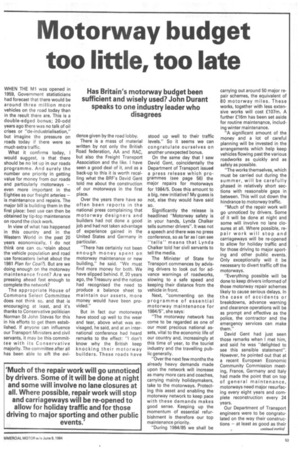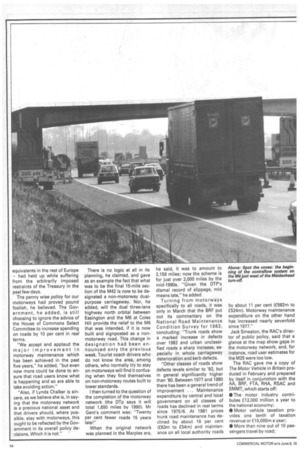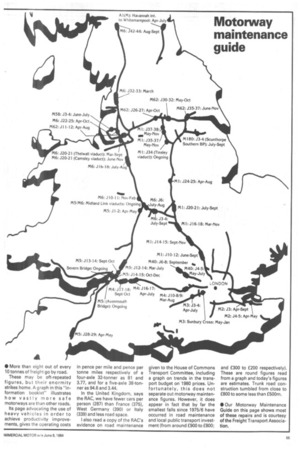Motorway budget too little, too late
Page 55

Page 56

Page 57

If you've noticed an error in this article please click here to report it so we can fix it.
WHEN THE M1 was opened in 1959, Government statisticians had forecast that there would be around three million more vehicles on the road today than in the result there are. This is a double-edged bonus; 20-odd years ago there was no talk of oil crises or "de-industrialisation," but imagine the pressure on roads today if there were so much extra traffic.
What it confirms today, I would suggest, is that there should be no let up in our roads programme. And surely the number one priority in getting value for money from our roads and particularly motorways — even more important in the Eighties as our freight arteries — is maintenance and repairs. The major bill is building them in the first place: best use can then be obtained by tip-top maintenance on round the clock work.
In view of what has happened in this country and in the Western World in the past 20 years economically, I do not think one can co;.,olain about the vehicle population and road use forecasters (what about the 1981 Plan for Coal?). But are we doing enough on the motorway maintenance front? Are we pressing ahead fast enough to complete the network?
The appropriate House of Commons Select Committee does not think so, and that is encouraging at least, and it's thanks to Conservative politician Norman St John Stevas for this in his efforts to get them established. If anyone can influence our Transport Ministers and civil servants, it may be this committee with its Conservative majority. The committee after all has been able to sift the evi dence given by the road lobby.
There is a mass of material written by not only the British Road federation, AA and RAC, but also the Freight Transport Association and the like. I have seen a good deal of it, and as a back-up to this it is worth recalling what the BRF's David Gent told me about the construction of our motorways in the first place.
Over the years there have so often been reports in the national press complaining that motorway designers and builders had not done a good job and had not taken advantage of experience gained in the United States and Germany in particular.
"There has certainly not been enough money spent on motorway maintenance or new building," he said. "We must find more money for both. We have slipped behind. If, 20 years ago, the Treasury and the nation had recognised the need to produce a balance sheet to maintain our assets, more money would have been provided."
But in fact our motorways have stood up well to the wear and tear, above what was envisaged, he said, and at an international conference had heard remarks to the effect: "I don't know why the British keep knocking their motorway builders. These roads have stood up well to their traffic levels." So it seems we can congratulate ourselves on another unexpected bonus.
On the same day that I saw David Gent, coincidentally the Department of Transport issued a press release which programmes (see page 56) the major repairs for motorways for 1984/5. Does this amount to a big, new initiative? My guess is not, else they would have said Significantly the release is headlined "Motorway safety is in your hands, Lynda Chalker tells summer drivers". It was not a speech and there was no press conference, so as far as I can see "tells" means that Lynda Chalker told her civil servants to tell the media.
The Minister of State for Transport commences by advising drivers to look out for advance warnings of roadworks, slowing to a safe speed and keeping their distance from the vehicle in front.
Next, "commenting on the programme of essential motorway maintenance for 1984/5", she says: "The motorway network has come to be regarded as one of our most precious national assets, vital to the economic life of our country and, increasingly at this time of year, to the tourist industry and the travelling public generally.
"Over the next few months the already heavy demands made upon the network will increase as many more cars and coaches, carrying mainly holidaymakers, take to the motorways. Protecting this asset and enabling the motorway network to keep pace with these demands makes good sense. Keeping up the momentum of essential refurbishment is therefore our top maintenance priority.
"During 1984/85 we shall be carrying out around 50 major repair schemes, the equivalent of 80 motorway miles. These works, together with less extensive works will cost £107m. A further £16m has been set aside for routine maintenance, including winter maintenance.
"A significant amount of the money and a lot of careful planning will be invested in the arrangements which help keep vehicles flowing past the various roadworks as quickly and as safely as possible.
"The works themselves, which must be carried out during the summer, will be carefully phased in relatively short sections with reasonable gaps in between. This will cut down the hindrance to motorway traffic, "Much of the repair work will go unnoticed by drivers. Some of it will be done at night and some will involve no lane closures at all. Where possible, repair work will stop and carriageways will be re-opened to allow for holiday traffic and for those driving to major sporting and other public events. Only exceptionally will it be necessary to divert traffic off the motorways.
"Everything possible will be done to keep drivers informed of those motorway repair schemes likely to cause serious delays. In the case of accidents or breakdowns, advance warning and clearance operations will be as prompt and effective as the police, the contractor and the emergency services can make them."
David Gent had just seen those remarks when I met him, and said he was "delighted to see this sensible statement". However, he pointed out that at a recent European Economic Community Commission meeting, France, Germany and Italy had made the point that on top of general maintenance, motorways need major resurfacing every eight years and complete reconstruction every 24 years.
Our Department of Transport engineers were to be congratulated on the way their constructions — at least as good as their equivalents in the rest of Europe — had held up while suffering from the arbitrarily imposed restraints of the Treasury in the past few days.
The penny wise policy for our motorways had proved pound foolish, he believed. The Government, he added, is still choosing to ignore the advice of the House of Commons Select Committee to increase spending on roads by 10 per cent in real terms.
"We accept and applaud the major improvement in motorway maintenance which has been achieved in the past five years," he added, "but even now more could be done to ensure that road users know what is happening and so are able to take avoiding action."
"Also, if Lynda Chalker is sincere, as we believe she is, in saying that the motorway network is a precious national asset and that drivers should, where possible, stay with motorways, this ought to be reflected by the Government in its overall policy decisions. Which it is not." There is no logic at all in its planning, he claimed, and gave as an example the fact that what was to be the final 15-mile section of the M42 is now to be designated a non-motorway dualpurpose carriageway. Nor, he added, will the dual three-lane highway north orbital between Easington and the M6 at Coles Hill provide the relief to the M6 that was intended, if it is now built and signposted as a nonmotorway road. This change in designation had been announced only the previous week. Tourist coach drivers who do not know the area, among others, who normally try to stay on motorways will find it confusing when they find themselves on non-motorway routes built to lower standards.
I then turned to the question of the :.-,ompletion of the motorway network (the DTp says it will total 1,650 miles by 1990). Mr Gent's comment was: "Twenty per cent fewer roads 15 years late!"
When the original network was planned in the Marples era, he said, it was to amount to 2,156 miles; now the scheme is for just over 2,000 miles by the mid-1990s, "Given the DTP's dismal record of slippage, mid means late," he added.
Turning from motorways specifically to all roads, it was only in March that the BRF put out its commentary on the National Road Maintenance Condition Survey for 1983, concluding: "Trunk roads show a marked increase in defects over 1982 and urban unclassified roads a sharp increase, especially in whole carriageway deterioration and kerb defects.
"Other classes of roads show defects levels similar to '82, but in general significantly higher than '80. Between 1977 and 1980 there has been a general trend of improvement Maintenance expenditure by central and local government on all classes of roads has declined in real terms since 1975/6. At 1981 prices trunk road maintenance has declined by about 16 per cent (£63m to £54m) and maintenance on all local authority roads by about 11 per cent (£582m to £524m). Motorway maintenance expenditure on the other hand has increased nearly sevenfold since 1977," Jack Smeaton, the RAC's director of public policy, said that a glance at the map show gaps in the motorway network, and, for instance, road user estimates for the M25 were too low.
The RAC gave me a copy of The Motor Vehicle in Britain produced in February and prepared by itself in conjunction with the AA, BRF, FTA, RHA, RSAC and SMMT, which starts off:
• The motor industry contributes £12,000 million a year to the national economy; • Motor vehicle taxation provides one tenth of taxation revenue or £10,000m a year; • More than nine out of 10 passengers travel by road; • More than eight out of every 10 tonnes of freight go by road.
These may be oft-repeated figures, but their enormity strikes home. A graph in this "information booklet" illustrates how vastly more safe motorways are than other roads.
Its page advocating the use of heavy vehicles in order to achieve productivity improvements, gives the operating costs
in pence per mile and pence per tonne miles respectively of a four-axle 32-tonner as 81 and 3.77, and for a five-axle 38-tonner as 94.6 and 3.44.
In the United Kingdom, says the RAC, we have fewer cars per person (287) than France (375), West Germany (390) or Italy (339) and less road space.
also read a copy of the RAC's evidence on road maintenance given to the House of Commons Transport Committee, including a graph on trends in the transport budget on 1980 prices. Unfortunately, this does not separate out motorway maintenance figures. However, it does appear in fact that by far the smallest falls since 1975/6 have occurred in road maintenance and local public transport investment (from around £900 to £800; and £300 to £200 respectively). These are round figures read from a graph and today's figures are estimates. Trunk road construction tumbled from close to £800 to some less than £500m.
























































































